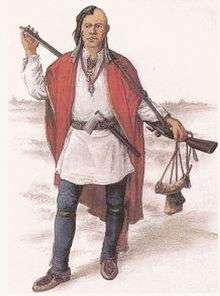Treaty of Watertown
The Treaty of Watertown, the first foreign treaty concluded by the United States of America after the adoption of the Declaration of Independence, was signed on July 19, 1776, in the Edmund Fowle House in the town of Watertown, Massachusetts Bay. The treaty established a military alliance between the United States and the St. John's and some of the Mi'kmaw bands against Great Britain for the early years of the American Revolutionary War.[1] (Seven Mi'kmaw bands chose to decline the American treaty.)[2]
| Military history of Miꞌkmaq people | ||||||||||||||||||||||||||||||||||||||||||||||||||||||||||||||||
|---|---|---|---|---|---|---|---|---|---|---|---|---|---|---|---|---|---|---|---|---|---|---|---|---|---|---|---|---|---|---|---|---|---|---|---|---|---|---|---|---|---|---|---|---|---|---|---|---|---|---|---|---|---|---|---|---|---|---|---|---|---|---|---|---|
 Miꞌkmaq warrior | ||||||||||||||||||||||||||||||||||||||||||||||||||||||||||||||||
| Events | ||||||||||||||||||||||||||||||||||||||||||||||||||||||||||||||||
|
||||||||||||||||||||||||||||||||||||||||||||||||||||||||||||||||
| Other | ||||||||||||||||||||||||||||||||||||||||||||||||||||||||||||||||
| ||||||||||||||||||||||||||||||||||||||||||||||||||||||||||||||||
Three years later, on 7 June 1779, the Mi'kmaq "delivered up" the Watertown treaty to Nova Scotia Governor Michael Francklin and re-established all the Mi'kmaw bands loyalty to the British. [3] [4] After the British resounding victory over the American Penobscot Expedition, according to Mi'kmaw historian Daniel Paul, Mi'kmaq in present-day New Brunswick renounced the Watertown treaty and signed a treaty of alliance with British on 24 September 1779.[5][6][7]
Terms
The treaty was signed by the "Governors" (Council) of the State of Massachusetts Bay, "in behalf of said State, and the other united States of America," just one day after the Declaration of Independence was proclaimed from the balcony of the Old State House in nearby Boston. After the Declaration had been translated, the Indigenous delegates said, "We like it well."[8] The preamble of the treaty quotes verbatim from the conclusion of the Declaration of Independence, asserting for the thirteen colonies "that as Free and Independent States they have full power to levy War, conclude Peace, contract Alliances, establish Commerce, and to do all other Acts & Things which Independent States may of Right do."[9]
Under the terms of the treaty, the Mi'kmaq and St. John's Tribes (Maliseet and Passamaquoddy) committed to "supply and furnish 600 strong men...or as many as may be" for service in the Continental Army. (600 Indigenous fighters from the Wabanaki confederacy was a significant reduction from the 1200 fighters estimated to be available during the French and Indian War.[10] There were 5000 British troops in Nova Scotia by 1778.[11])
Three of the six Mi'kmaq delegates who signed the treaty "manfully and generously" volunteered to enlist immediately. The treaty also notes that their pay would commence upon their arrival at Washington's camp in New York. Tribal forces formed an "American Battalion" in the Battle of Fort Cumberland (November 22 – December 28, 1776). They also protected the Maine border and launched other attacks against British installations.[12] Since 1995, the town of Watertown, Massachusetts has held an annual Treaty Day celebration.
Mi'kmaw historian Daniel N. Paul notes many individual Mi'kmaq did indeed volunteer and serve with the Continental army as per the terms of the Treaty. However the Signators who signed on were representing only their bands; its part of Mi'kmaq Treaty protocol that each bands was Sovereign and could sign Nation to Nation agreements; then they would return home to present the agreements to the Grand Council, the Council of Women, and finally to all citizens, which if consensus occurred, the newly signed Treaty would be ratified District by District. The Watertown Treaty was never fully ratified by all Mi'kmaq bands until modern times.
The Treaty of Watertown is still honored today: all Mi'kmaq are allowed to join the US Armed Forces, regardless of the Nation of their birth. These warriors who have gone to Iraq and Afghanistan, and many other places around the world are celebrated.
See also
- List of treaties
- Timeline of United States diplomatic history
- Treaty Day (Nova Scotia)
- Military history of the Mi’kmaq People
- Nova Scotia in the American Revolution
Notes
- Paul, Daniel N. (2006). We Were Not the Savages: Collision Between European and Native American Civilizations (3rd ed.). Fernwood. pp. 180–185. ISBN 978-1-55266-209-0. (includes full text of both treaties).
References
- https://archive.org/stream/documentaryhisto24main#page/164/mode/2up
- Military operations in eastern Maine and Nova Scotia during ... Kidder, Frederic, 1804-1885., p. 57
- Michael Francklin, p. 282
- Beamish Murdoch. History of Nova Scotia, p. 599
- Paul, Daniel N. (2000). We Were Not the Savages: A Mi'kmaq Perspective on the Collision Between European and Native American Civilizations (2nd ed.). Fernwood. pp. 169–170. ISBN 978-1-55266-039-3. (includes full text of both treaties).
- Murdoch, Beamish (1866). A History of Nova-Scotia, Or Acadie. Vol. II. Halifax: J. Barnes. p. 595.
- John Allen re: Watertown, p.318
- Groden & Simon.
- https://bizstanding.com/p/executive+office+of+the+president-169914185
- Scott, Tod (2016). "Mi'kmaw Armed Resistance to British Expansion in Northern New England (1676–1761)". Journal of the Royal Nova Scotia Historical Society. 19: 1–18.
- Murdoch. History of Nova Scotia. p.594
- Denny (1987).
- end of wabanaki "confederacy" clarification that wabanaki are part of the union or the commonwealth after the civil war *https://www.justice.gov/sites/default/files/civil/legacy/2011/04/22/C-FRAUDS_FCA_Primer.pdf
Sources
- Christopher Groden & Gary Simon, "Alliance and Renewal". WatertownTreaty.org, retrieved January 2, 2006.
- Alex Denny (Mi'kmaq Grand Captain), Address to the Massachusetts House of Representatives, June 24, 1987. WatertownTreaty.org, retrieved January 2, 2006.
External links
- https://www.justice.gov/sites/default/files/civil/legacy/2011/04/22/C-FRAUDS_FCA_Primer.pdf
- Full Text of Watertown Treaty
- Image of Watertown Treaty
- PDF Images of Treaty Manuscript with Background History and Commentary from the Mi'kmaq
- Washington's Correspondence with the Continental Congress
- Massachusetts Executive Order No. 126 (July 8, 1976)
- https://www.usaopps.com/government_contractors/contractor-5982179-MIKMAQ-AMERICAN-TRUCKHOUS.htm